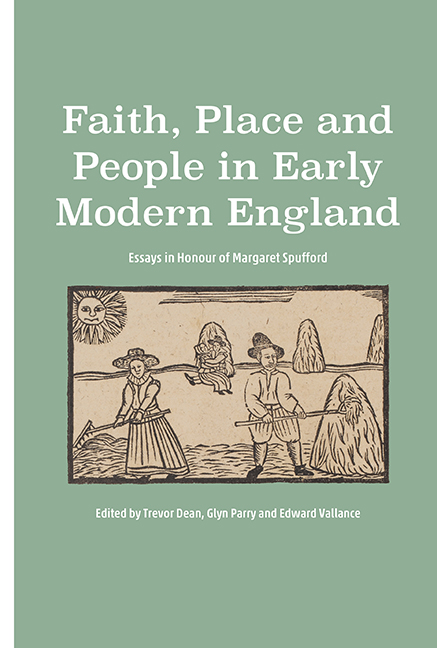Book contents
- Frontmatter
- Dedication
- Contents
- List of Illustrations
- List of Contributors
- Record Office Abbreviations
- Acknowledgements
- Introduction
- Margaret
- Part I Faith
- Part II Place
- Part III People
- 7 ‘Flowered silk is little worn but gold and silver striped is much worn’: Metropolitan Clothing Consumption in Late Seventeenth- Century Sussex
- 8 A Cuckold in Space: The ‘Ballading’ of Stephen Seagar, 1669
- 9 Marginal People in a Stressful Culture: Gypsies and ‘Counterfeit Egyptians’ in Margaret Spufford's England
- Bibliography of Margaret Spufford's works
- Index
- Tabula in Memoriam
8 - A Cuckold in Space: The ‘Ballading’ of Stephen Seagar, 1669
from Part III - People
Published online by Cambridge University Press: 19 July 2019
- Frontmatter
- Dedication
- Contents
- List of Illustrations
- List of Contributors
- Record Office Abbreviations
- Acknowledgements
- Introduction
- Margaret
- Part I Faith
- Part II Place
- Part III People
- 7 ‘Flowered silk is little worn but gold and silver striped is much worn’: Metropolitan Clothing Consumption in Late Seventeenth- Century Sussex
- 8 A Cuckold in Space: The ‘Ballading’ of Stephen Seagar, 1669
- 9 Marginal People in a Stressful Culture: Gypsies and ‘Counterfeit Egyptians’ in Margaret Spufford's England
- Bibliography of Margaret Spufford's works
- Index
- Tabula in Memoriam
Summary
A previously unknown broadside ballad, dating from the 1660s, has recently come to light in the archives at Lambeth Palace. It bears the title The Joyners Job finished OR, The Loving Mistress, and there appears to be no other surviving copy. It describes recent events in the life of an unnamed joiner who lives, according to the narrator, ‘not far from this place I do hear’. The joiner's sexual inadequacy has combined disastrously with his lustful wife's longing for a baby. She commits adultery, first with a local glazier and then, more sensationally, with her husband's own apprentice. When the joiner realises what has happened, he makes a fool of himself by publicising his shameful predicament, in the mistaken hope that others will offer him sympathy and support. In many ways, the ballad was a fairly standard production: the title and subtitle are followed by ten verses, all designed for singing to one of two tunes that are named but not notated; each verse ends with a catchy singalong refrain; three woodcut pictures, all recycled from other ballads, provide additional visual interest; and, at the bottom, a line of text states that the song was ‘Printed for J. Clarke at the Harp and Bible in West Smith-field’. In one respect, however, the song is a peculiarity. The unique copy was preserved as an exhibit in the papers relating to a case that was heard in the Court of Arches during the autumn of 1669. Stephen Seagar, a joiner, sought a judicial separation from his wife, Grace, claiming that she had committed adultery with his apprentice, Tarrant Reeve (already it feels familiar). Seagar claimed that the song was all about him and his household, adding that ‘many copies’ were in circulation on the streets around his home in Little Britain, London. Unusually, therefore, we can trace the origins of a specific printed ballad and connect it very closely to named individuals and to the environment in which they lived. Adam Fox has observed that broadside ballads are difficult to interpret because ‘we have the texts but not the contexts’. In this instance, we are lucky enough to have both.
- Type
- Chapter
- Information
- Faith, Place and People in Early Modern EnglandEssays in Honour of Margaret Spufford, pp. 175 - 201Publisher: Boydell & BrewerPrint publication year: 2018



